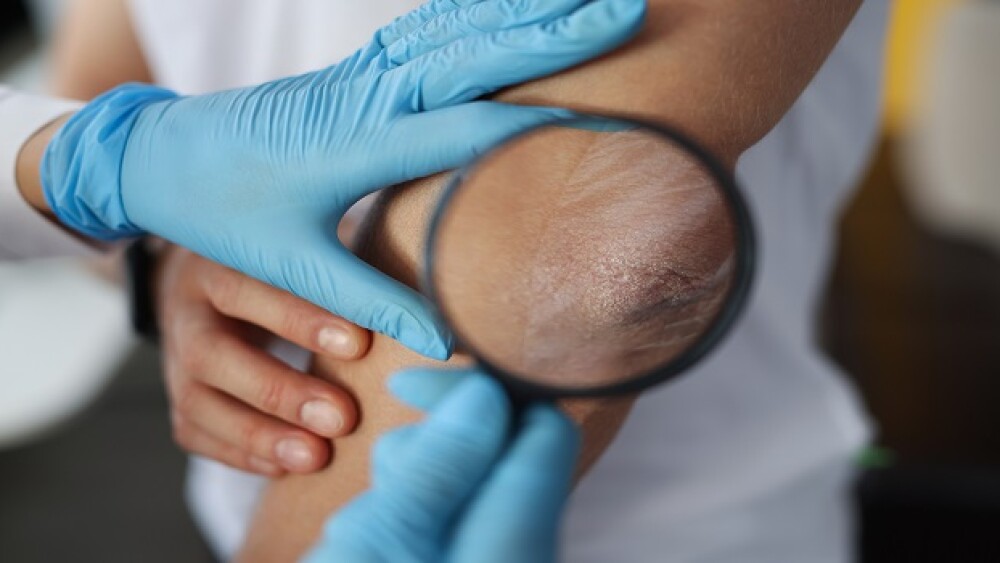Aldeyra Therapeutics will announce three clinical trials involving ADX-629, its first-in-class oral RASP modulator, at its 2022 Research & Development Day.
Lexington, Mass.-based Aldeyra Therapeutics is updating investors on its pipeline at its 2022 Research & Development Day. Three clinical trials will be announced involving ADX-629, its first-in-class oral RASP modulator.
The first announcement is related to topline data from a Phase II proof-of-concept trial of the drug for psoriasis. The company reported results in 10 patients with moderate psoriasis who received the drug. At 12 weeks, psoriasis area and severity index (PASI) scores demonstrated statistically significant drops compared to baseline and peak PASI 50% and PASI 75% responder percentages of 57% and 25%, respectively.
Global assessment scores by investigators also decreased during the length of treatment. Analysis of lesional pan-gene expression suggested a trend toward normalization of global gene expression patterns.
Aldeyra is also reporting results from a placebo-controlled crossover trial of the drug in eight patients with mild asthma for seven days. The patient’s asthma symptom scores and sputum eosinophil cell counts dropped after receiving the drug compared to placebo, at least numerically.
Patients with ADX-629 demonstrated statistically significant decreases in plasma levels of IL-5 and TNF alpha, both pro-inflammatory cytokines. The company also reported numerical decreases in malondialdehyde in the plasma.
Finally, Aldeyra is reporting on a study of 11 patients with mild to moderate COVID-19 who received ADX-629 or placebo for four weeks. The patients receiving the drug reported changes from baseline in the National Institute of Allergy and Infectious Diseases Score (NIAID) that were numerically higher than in the placebo cohort. The NIAID score of 1 equals death and 8 equals no activity limitation. They also observed decreases in plasma levels of the cytokines CXCL9, IFN gamma and TNF alpha.
“The promising results exhibited by ADX-629 represent the first clinical data supportive of RASP modulation as a novel pharmacology for the potential treatment of systemic disease,” said Dr. Todd C. Brady, MD, Ph.D., president and CEO of Aldeyra. “Accordingly, we plan to advance our proprietary RASP modulator platform, which includes ADX-629 and other novel molecules, into new indications mediated by RASP, effecting a new milestone for Aldeyra as we continue to expand our focus to systemic and retinal diseases.”
The new indications the company plans to investigate for the drug include ethanol toxicity, chronic cough, minimal change disease (a rare renal disease that typically afflicts children) and Sjogren-Larsson Syndrome, a rare disease associated with inborn error of aldehyde metabolism. Data from the ethanol toxicity study are expected in the second half of this year, and data from the other new indications are expected in 2023.
On March 17, Aldeyra reported full-year 2021 financial results. As of Dec. 31, 2021, the company had $229.8 million in cash and cash equivalents. It believes that will be enough to operate through the end of 2023, including possible New Drug Application (NDA) submissions and initial commercialization of reproxalap.
“In addition to our planned completion of clinical development for reproxalap in dry eye disease, 2022 is expected to highlight data milestones for our systemic and retinal disease platforms,” Brady said at the time. “We are excited about the planned release this month of topline data from our proof-of-concept clinical trials of ADX-629, a first-in-class RASP modulator, across a variety of systemic inflammatory diseases, and we look forward to reporting results of our recently initiated clinical trial of ADX-2191 in retinitis pigmentosa in the second half of this year.”





